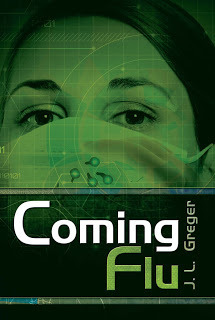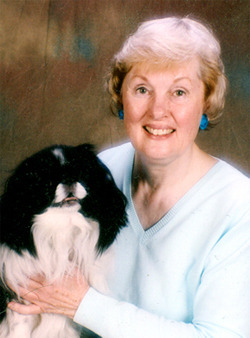Learn Science & Have Fun - Read a Novel on Science
(JL Greger, author of Coming Flu and the soon-to-be-released Murder: A New Way To Lose Weight, both published by Oak Tree Press, is my guest today. She has been a scientist, professor, textbook writer (
Nutrition for Living
), and university administrator. Now she writes medical mystery/suspense novels.)
 The U.S.’s rank in the Global Innovative Index dropped from seventh to tenth this year. Although the validity of the survey could be questioned (Education Week, J. Tomassini blog, July 9, 2012), most experts on education would agree that the average American is not as scientifically literate as (s)he should be. Accordingly, government agencies and scientific organizations have invested heavily in science education programs for children and teens, for example, AAAS Project 2061: Benchmarks for Science Literacy (www.project2061.org/publications/bsl/...). These programs focus on making science fun for children.
The U.S.’s rank in the Global Innovative Index dropped from seventh to tenth this year. Although the validity of the survey could be questioned (Education Week, J. Tomassini blog, July 9, 2012), most experts on education would agree that the average American is not as scientifically literate as (s)he should be. Accordingly, government agencies and scientific organizations have invested heavily in science education programs for children and teens, for example, AAAS Project 2061: Benchmarks for Science Literacy (www.project2061.org/publications/bsl/...). These programs focus on making science fun for children.
What about adults? Who makes science fun for adults?Fun depends on the eyes of the beholders. Many adults enjoy the thousands of non-fiction books on science topics (medicine, the environment, astronomy, etc) published for the general public every year. A few of these “science books” read like action novels, particularly Richard Preston’s The Hot Zone and The Demon in the Freezer . If you like horror, it’s hard to beat Preston’s description of the symptoms of smallpox with the skin peeling from the live bodies. And John Barry really “develops the character” of several of the dedicated (but quirky) scientists, leading medicine at the time of The Great Influenza (the early 1900’s).
What if you prefer fiction? A number of authors, many of them scientists or physicians themselves, are using scientific tidbits to add color to their novels without overwhelming the plot. For example, a scientist asked me why I didn’t mention cytokine storms in my novel Coming Flu . I replied that I’ve seen a glazed look in the eyes of too many college biology students when cytokine storms (over reactions of the body’s immune system to the flu virus that cause many symptoms) were explained. Despite the “short cut,” you’ll learn a bit about vaccine development and immunology from Coming Flu . More importantly you’ll think about the wonders and limits of modern biology.
My next novel Murder: A New Way to Lose Weight (due out in March) is from the point of view of a physician investigating charges of scientific misconduct against a “diet” doctor. I was a professor in nutrition and toxicology.
Robin Cook, a physician, wrote more than twenty-five medical thrillers, the most famous being Coma.
Did you know Michael Crichton graduated from Harvard Medical School before he became an author and film director? Although his novels (e.g. The Andromeda Strain , Jurassic Park ) are science fiction, I find he cleverly includes bits of real science in them.
Kathy Reichs, an anthropology professor, writes of modern forensic anthropological techniques in her Tempe Brennan series of crime novels. Her books became the basis of the TV series Bones .
Camille Minichino, a physicist, writes mysteries with titles based on the periodic table (e.g.. The Hydrogen Murder , The Lithium Murder ).
So why not borrow one of these books from the library or better still buy one. I think you may decide that science is fun.
In Coming Flu , a new, mysterious flu strain kills more than two hundred in less than a week in the small walled community near the Rio Grande. The rest face a bleak future under quarantine. One of the residents Sara Almquist, as a medical epidemiologist, pries into every aspect of her neighbors’ lives looking for ways to stop the spread of the flu. She finds promising clues – maybe one too many? Not all her neighbors are what they appear to be.
Be the first in your neighborhood to read MURDER: A NEW WAY TO LOSE WEIGHT (Oak Tree Press is publishing it in March 2013). Someone in this southwestern medical school doesn’t like women. Two have been murdered already. At first, Linda Almquist suspects the deaths are related to her investigation of Dr. Richard Varegos, a “diet doctor,” who is recklessly endangering the lives of his obese research subjects. Maybe she’s wrong. The murders might be related to something in the past – something involving her boss the Dean. While Linda fears for her job, the police fear for her life.
 The U.S.’s rank in the Global Innovative Index dropped from seventh to tenth this year. Although the validity of the survey could be questioned (Education Week, J. Tomassini blog, July 9, 2012), most experts on education would agree that the average American is not as scientifically literate as (s)he should be. Accordingly, government agencies and scientific organizations have invested heavily in science education programs for children and teens, for example, AAAS Project 2061: Benchmarks for Science Literacy (www.project2061.org/publications/bsl/...). These programs focus on making science fun for children.
The U.S.’s rank in the Global Innovative Index dropped from seventh to tenth this year. Although the validity of the survey could be questioned (Education Week, J. Tomassini blog, July 9, 2012), most experts on education would agree that the average American is not as scientifically literate as (s)he should be. Accordingly, government agencies and scientific organizations have invested heavily in science education programs for children and teens, for example, AAAS Project 2061: Benchmarks for Science Literacy (www.project2061.org/publications/bsl/...). These programs focus on making science fun for children.What about adults? Who makes science fun for adults?Fun depends on the eyes of the beholders. Many adults enjoy the thousands of non-fiction books on science topics (medicine, the environment, astronomy, etc) published for the general public every year. A few of these “science books” read like action novels, particularly Richard Preston’s The Hot Zone and The Demon in the Freezer . If you like horror, it’s hard to beat Preston’s description of the symptoms of smallpox with the skin peeling from the live bodies. And John Barry really “develops the character” of several of the dedicated (but quirky) scientists, leading medicine at the time of The Great Influenza (the early 1900’s).
What if you prefer fiction? A number of authors, many of them scientists or physicians themselves, are using scientific tidbits to add color to their novels without overwhelming the plot. For example, a scientist asked me why I didn’t mention cytokine storms in my novel Coming Flu . I replied that I’ve seen a glazed look in the eyes of too many college biology students when cytokine storms (over reactions of the body’s immune system to the flu virus that cause many symptoms) were explained. Despite the “short cut,” you’ll learn a bit about vaccine development and immunology from Coming Flu . More importantly you’ll think about the wonders and limits of modern biology.
My next novel Murder: A New Way to Lose Weight (due out in March) is from the point of view of a physician investigating charges of scientific misconduct against a “diet” doctor. I was a professor in nutrition and toxicology.
Robin Cook, a physician, wrote more than twenty-five medical thrillers, the most famous being Coma.
Did you know Michael Crichton graduated from Harvard Medical School before he became an author and film director? Although his novels (e.g. The Andromeda Strain , Jurassic Park ) are science fiction, I find he cleverly includes bits of real science in them.
Kathy Reichs, an anthropology professor, writes of modern forensic anthropological techniques in her Tempe Brennan series of crime novels. Her books became the basis of the TV series Bones .
Camille Minichino, a physicist, writes mysteries with titles based on the periodic table (e.g.. The Hydrogen Murder , The Lithium Murder ).
So why not borrow one of these books from the library or better still buy one. I think you may decide that science is fun.

In Coming Flu , a new, mysterious flu strain kills more than two hundred in less than a week in the small walled community near the Rio Grande. The rest face a bleak future under quarantine. One of the residents Sara Almquist, as a medical epidemiologist, pries into every aspect of her neighbors’ lives looking for ways to stop the spread of the flu. She finds promising clues – maybe one too many? Not all her neighbors are what they appear to be.
Be the first in your neighborhood to read MURDER: A NEW WAY TO LOSE WEIGHT (Oak Tree Press is publishing it in March 2013). Someone in this southwestern medical school doesn’t like women. Two have been murdered already. At first, Linda Almquist suspects the deaths are related to her investigation of Dr. Richard Varegos, a “diet doctor,” who is recklessly endangering the lives of his obese research subjects. Maybe she’s wrong. The murders might be related to something in the past – something involving her boss the Dean. While Linda fears for her job, the police fear for her life.
Published on February 20, 2013 04:51
No comments have been added yet.



